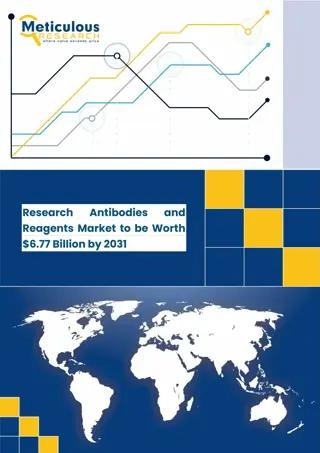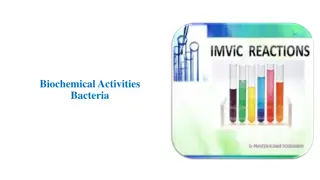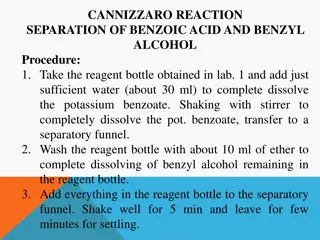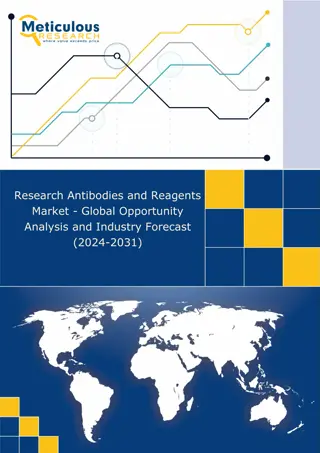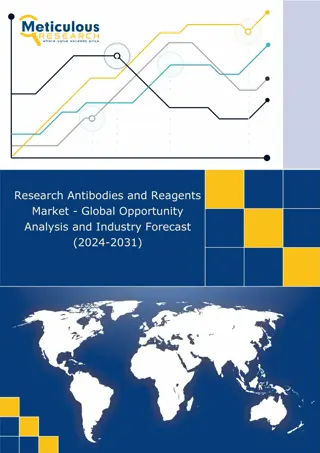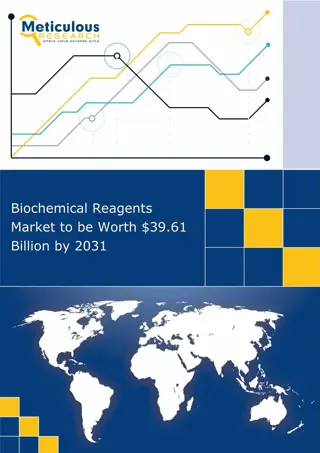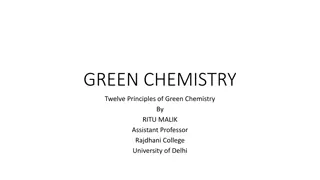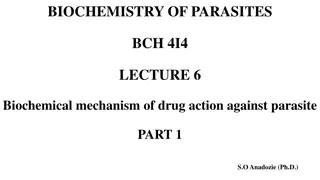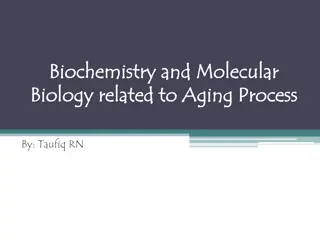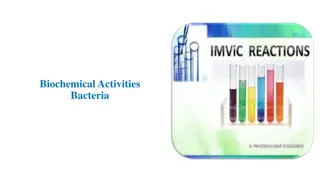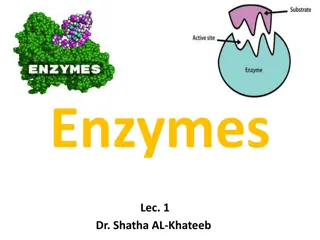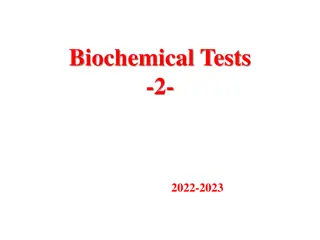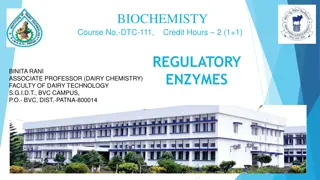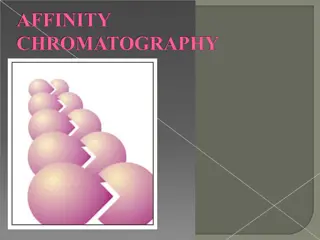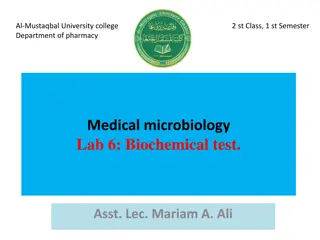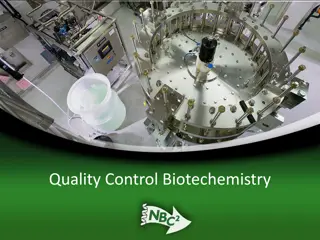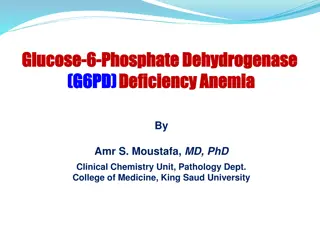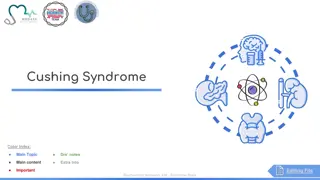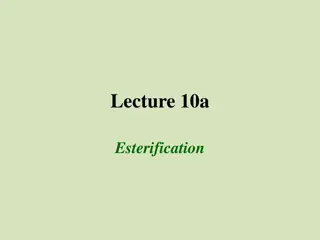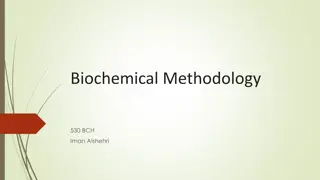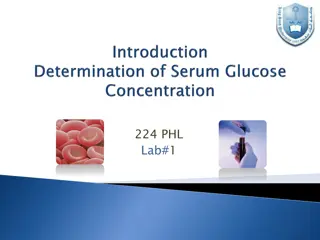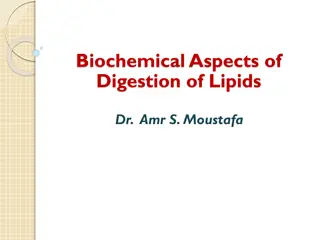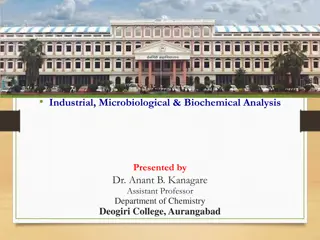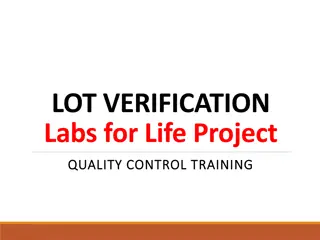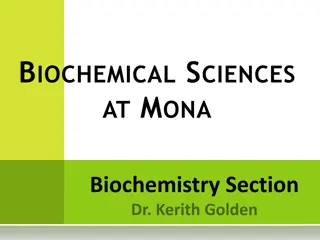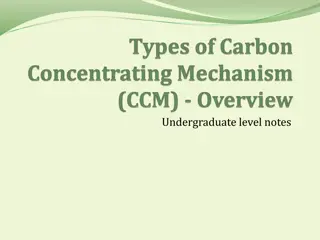Research Antibodies and Reagents Market to be Worth $6.77 Billion by 2031
Research Antibodies and Reagents Market by Product (Antibodies {Type [Primary, Secondary]} {Production [mAb, pAb]} {Source [Mouse, Rabbit]} Research Area} Media, Stains, Enzyme) Technology (ELISA, Flow Cytometry), Application\u2014Global Forecast to 2031
2 views • 4 slides
Comprehensive IT & Security Solutions for Home and Business Needs
ONE STEP SOLUTION offers a range of IT services including computer sales & services, security solutions, CCTV surveillance systems, networking, fire alarm systems, and more. PROLOGIC SOLUTIONS provides reliable IT and security solutions for industrial and residential requirements, specializing in CC
0 views • 15 slides
Understanding Biogas Production from Kitchen Waste for Green Energy Solutions
Biogas, a methane-rich gas produced from organic waste, offers an eco-friendly energy solution through anaerobic digestion. Learn about its composition, advantages, and disadvantages, as well as the biochemical reactions involved in its production. Discover the various modes of operation and types o
7 views • 22 slides
Bacterial Biochemical Identification Tests in Microbiology
Understand the significance of biochemical tests like the Triple Sugar Iron Agar Test (TSI) and the IMViC Test for identifying enteric bacteria. Learn about indole production, methyl red test, and other methods used in bacteriology.
5 views • 17 slides
Cannizzaro Reaction: Separation of Benzoic Acid and Benzyl Alcohol
The Cannizzaro reaction involves the separation of benzoic acid and benzyl alcohol by utilizing various reagents and procedures such as dissolving potassium benzoate, washing with ether, and treatment with different solutions to isolate the desired compounds. The process involves multiple steps incl
7 views • 4 slides
Reagent Preparation for Food Analysis: Barfoed's and Seliwanoff's Tests
Preparation of reagents such as Barfoed's reagent and Seliwanoff's reagent is essential for detecting monosaccharides in food analysis. Barfoed's test utilizes a mixture of acetic acid and copper(II) acetate to detect reducing sugars, while Seliwanoff's reagent helps identify ketoses in solutions. U
2 views • 19 slides
Research Antibodies and Reagents Market - Global Opportunity Analysis and Industry Forecast (2024-2031)
Meticulous Research\u00ae\u2014a leading global market research company, published a research \nreport titled, \u2018Research Antibodies and Reagents Market by Product (Antibodies {Type \n[Primary, Secondary]} {Production [mAb, pAb]} {Source [Mouse, Rabbit]} Research Area} \nMedia, Stains, Enzyme) T
3 views • 4 slides
Research Antibodies and Reagents Market - Global Opportunity Analysis and Industry Forecast (2024-2031)
Meticulous Research\u00ae\u2014a leading global market research company, published a research report titled, \u2018Research Antibodies and Reagents Market\u2019 by Product (Antibodies {Type [Primary, Secondary]} {Production [mAb, pAb]} {Source [Mouse, Rabbit]} Research Area} Media, Stains, Enzyme) T
5 views • 4 slides
Biochemical Reagents Market
Meticulous Research\u00ae\u2014a leading global market research company, published a research report titled, \u2018Biochemical Reagents Market by Type (PCR, Chromatography, Cell & Tissue Culture, Flow Cytometry, Electrophoresis, Immunoassay) End User (Pharmaceutical & Biotechnology, CRO, Diagnostic
1 views • 4 slides
Principles of Green Chemistry: Catalysis and Bio-Catalysis
The 9th Principle of Green Chemistry emphasizes the use of catalysis to improve reaction efficiency and reduce waste generation. Catalytic reagents enhance selectivity, reduce energy consumption, and minimize the need for stoichiometric reagents. Green catalysis, especially bio-catalysis using enzym
0 views • 25 slides
Principles of Staining in Histopathologic Techniques
Beginning with an introduction to staining in biochemical techniques, this chapter delves into the types of stains, factors influencing selectivity, and commonly used stains in histopathology. Learning objectives include defining staining, discussing dye-tissue affinity, understanding selectivity fa
2 views • 107 slides
Understanding Biochemical Mechanisms of Drug Action Against Parasites
Parasitic protozoa cause devastating diseases in humans and animals, and chemotherapy is the primary defense. Drug resistance is a challenge, and prevention is crucial. Modern tools aid in studying genetic and biochemical aspects, targeting the parasite selectively. Drugs act by interfering with spe
1 views • 15 slides
Understanding Aging Process from a Biochemical Perspective
Biochemistry and Molecular Biology play crucial roles in understanding the aging process, focusing on the biochemical basis of life, the basis of health, major causes of diseases, and theories of aging. Aging is described as the accumulation of damage due to reactive oxygen species, with theories en
2 views • 11 slides
Understanding Biochemical Tests for Bacterial Identification
Explore the importance of biochemical tests like Triple Sugar Iron Agar and IMViC in identifying enteric bacteria. Learn about indole production and the Methyl Red test, essential in distinguishing bacterial species based on their metabolic activities. Discover how these tests aid in diagnosing food
2 views • 17 slides
Understanding Enzymes: The Key Catalysts in Biochemical Reactions
Enzymes are biological catalysts that play a crucial role in various life processes by speeding up chemical reactions. They are specific, protein-based molecules that lower the activation energy required for reactions, ensuring proper metabolism and efficiency in living organisms. Factors like pH, t
1 views • 46 slides
Understanding Parenteral Fluid Therapy and IV Solutions
This informative content explores the essentials of parental fluids therapy, including the indications, types of IV solutions (isotonic, hypotonic, hypertonic), and categories of intravenous solutions based on their purpose. It covers the significance of IV solutions containing dextrose or electroly
0 views • 37 slides
Understanding Ion-Pair Chromatography (IPC): Theory and Applications
Ion-Pair Chromatography (IPC) involves adding ionic surfactants to a reversed-phase Chromatography system to affect retention and selectivity of ionic compounds. Developed by Dr. Gordon Schill, IPC is crucial for resolving hydrophilic samples and controlling selectivity in separations. The theory in
6 views • 18 slides
Understanding the Triple Sugar Iron Test in Biochemical Analysis
The Triple Sugar Iron Test (TSI) is a crucial biochemical test used to differentiate gram-negative enteric bacilli based on their carbohydrate fermentation and hydrogen sulfide production. By examining color changes, gas production, and precipitate formation, microbiologists can interpret TSI result
2 views • 31 slides
Understanding Regulatory Enzymes in Biochemical Pathways
Regulatory enzymes play a crucial role in controlling the activity of biochemical pathways by responding to the presence of specific molecules. They regulate the pathway's activity, ensuring that products are produced in the required amounts at different times. This article delves into the significa
5 views • 22 slides
Affinity Chromatography: A Breakthrough in Biochemical Research
Affinity chromatography, developed in the 1930s by A. Wilhelm Tiselius, is a vital technique for studying enzymes and proteins. It relies on the specific affinity between biochemical compounds and utilizes matrices like agarose for binding sites. Ligands such as amino and hydroxyl groups play crucia
1 views • 27 slides
Understanding Linear Equations in Two Variables
Explore linear equations in two variables, solving systems of equations, graphing solutions, and determining types of solutions. Learn how to analyze and find solutions graphically, identify infinite solutions, no solutions, and unique solutions, and understand the concept of dependent systems. Disc
0 views • 35 slides
Explore Membership Benefits with the Biochemical Society
Elevate your career with the Biochemical Society membership offering various benefits like grants, recognition awards, and cost-saving opportunities for attending events and conferences. Members enjoy access to prestigious journals and free secretariat services for hosting successful conferences. Jo
0 views • 11 slides
Microbiology Biochemical Tests for Bacterial Identification
Learn about important biochemical tests used in medical microbiology, including the Coagulase test for Staphylococcus aureus, the Catalase test for enzyme detection, and the Oxidase test for electron transport chain identification. Detailed methods and result interpretations are provided for each te
0 views • 17 slides
Understanding Concentration of Solutions in Physiology
Concentration of solutions is crucial in understanding the properties of substances in Physiology. This involves concepts like percentage solutions and molar solutions, where the amount of solute is measured in grams or moles relative to the volume of the solution. Percentage solutions are commonly
0 views • 8 slides
Biochemical Quality Control Processes in Biotechnology
Quality control in biotechnology involves monitoring and regulating the levels of various components and impurities throughout the production process. Common methods of removal or purification include chromatography, filtration, and extraction. Scale-up considerations include changes in utility requ
0 views • 31 slides
Understanding G6PD Deficiency Hemolytic Anemia: Biochemical Basis and Implications
G6PD deficiency hemolytic anemia is an inherited condition characterized by reduced levels of glucose-6-phosphate dehydrogenase (G6PD), leading to impaired production of NADPH. This deficiency affects the Pentose Phosphate Pathway (PPP) and can result in oxidative stress, causing damage to DNA, prot
0 views • 18 slides
Understanding Cortisol and Cushing's Syndrome: Biochemical Insights
This content delves into the physiological and biochemical aspects of cortisol, diagnostic algorithms for Cushing's syndrome, and the interpretation of laboratory and radiological investigations for diagnosis. Explore the adrenal gland's anatomical features, the HPA axis, and glucocorticoid function
0 views • 16 slides
Comprehensive Overview of Esterification Reactions
Esterification is a versatile chemical process to synthesize esters, involving various methods like Fischer esterification, Schotten-Baumann reaction, and Steglich esterification. Different reagents and catalysts are utilized for efficient ester formation, with considerations like reaction equilibri
0 views • 10 slides
Biochemical Methodology 530 - Lactate Dehydrogenase Extraction and Purification Experiment
This course focuses on the extraction and purification of lactate dehydrogenase (LDH) using a series of procedures involving tissue preparation, centrifugation, and ammonium sulfate precipitation. The methodology includes detailed steps from preparing the extraction buffer to isolating LDH in differ
0 views • 10 slides
Understanding Biochemical Experiments and Blood Components
This content delves into various aspects of biochemical experiments, including qualitative and quantitative methods for substance identification and concentration measurement. It also covers the use of a spectrophotometer and different bodily fluids for analysis. Additionally, it explores the compon
0 views • 20 slides
Understanding Mixtures: Types and Examples
A mixture is a combination of different ingredients that can be separated. There are various types of mixtures such as liquid solutions, solid solutions, and gas solutions. Liquid solutions involve solid substances dissolved in a liquid, like sugar in water, while solid solutions include metal alloy
0 views • 15 slides
Biochemical Aspects of Lipid Digestion by Dr. Amr S. Moustafa
This lecture by Dr. Amr S. Moustafa covers the biochemical aspects of lipid digestion, including the process, organs involved, enzymes required, and end products. It discusses the assembly, metabolism, and fate of chylomicrons, as well as the clinical manifestations of diseases related to defective
0 views • 31 slides
Industrial, Microbiological & Biochemical Analysis - Course Overview by Dr. Anant B. Kanagare
Dr. Anant B. Kanagare, an Assistant Professor at Deogiri College, Aurangabad, presents a comprehensive course on Industrial, Microbiological, and Biochemical Analysis (Course Code ACH502). The course covers topics such as Industrial Analysis, Microbiological Analysis, and Biochemical Analysis. Dr. K
0 views • 16 slides
Chemistry 1151K Course Overview and Chapters Summary
Upon completion of the CHEM 1151K course, students will apply the scientific method to investigate chemical questions in allied health, utilize dimensional analysis to solve quantitative problems, communicate effectively using chemical terminology and symbols, describe the behavior of biochemical so
0 views • 44 slides
Detecting Cobalt(II) Ion Reactions in Solutions
This experiment outlines various methods for detecting Cobalt(II) ions (Co2+) in solution using reagents like sodium hydroxide, ammonia, sodium or potassium carbonate, and more. Observations and changes in color are noted throughout the process to identify the presence of the Cobalt ions. The reacti
0 views • 19 slides
Quality Control Training for Labs: Ensuring Reagent and Consumable Quality
This project focuses on maintaining quality control in laboratories by verifying reagents and consumables, adhering to ISO and NABL standards. It includes checking and verifying each lot of control and reagent, assessing transportation factors, monitoring temperature control, and performing lot-to-l
0 views • 13 slides
Standard G6PD Test Quality Assurance Guide
This comprehensive guide covers the quality assurance features of the SD Biosensor STANDARD G6PD Test, including instructions on checking the strip, code chip, and control reagents. Learn how to use the check strip, change the code chip, and utilize quality control reagents for accurate testing resu
0 views • 14 slides
Department of Biochemical Sciences at MONA: Biochemistry Section, Academic Staff, Research Highlights, and Courses Offered
Explore the prestigious Department of Biochemical Sciences at MONA, specializing in Biochemistry, Anatomy, Physiology, Pharmacology, Physical Therapy, and Dentistry. Learn about the dedicated academic staff, research highlights in medical and plant biochemistry, and offered degrees. Discover the com
0 views • 11 slides
Mechanisms of Carbon Concentration in Plants: Biochemical and Biophysical Variants
Biochemical and biophysical mechanisms of carbon concentration in plants involve variations such as C4 and CAM pathways in higher plants, as well as specific adaptations in algae and cyanobacteria. These mechanisms play a crucial role in efficiently managing carbon fixation processes in different ty
0 views • 6 slides
Advancing Enterprise Solutions Presentation for Discussion
This presentation focuses on advancing enterprise solutions within the Government of Canada, particularly in the context of whole-of-government approaches and digital transformation. It discusses the importance of a holistic enterprise approach, governance solutions, and how enterprise is addressed
0 views • 17 slides
